Sep 6, 2025 – Baekjung Closing Ceremony
Hello. Today is Baekjung, the day we dedicate the merits of the 49-day Baekjung Prayer that has been conducted.
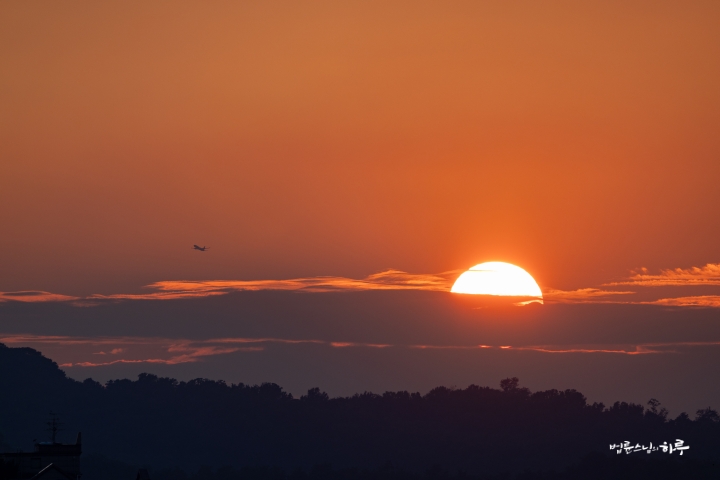
To conduct the Baekjung closing ceremony, Sunim departed from Dubuk Jungto Retreat Center at 3 AM and headed to Seoul. After a three-hour drive, he arrived at Seoul Jungto Center at 6 AM.
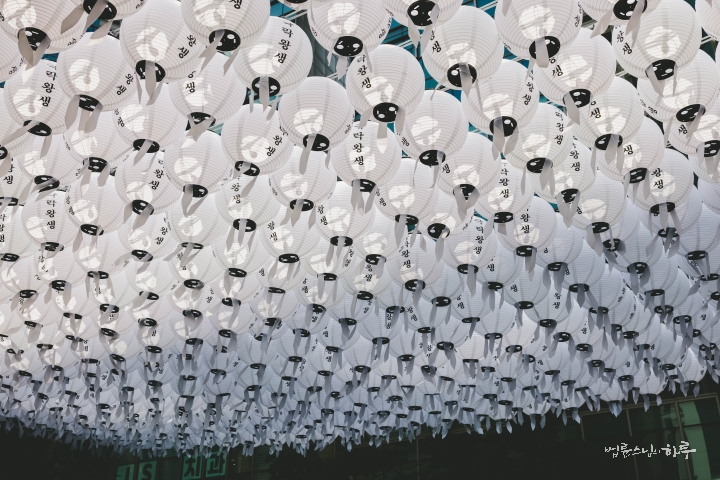
After breakfast, Sunim headed to the Dharma Hall on the third floor of Jungto Social and Cultural Center. At exactly 10 AM, the Baekjung closing ceremony began with the recitation of the Three Refuges and the Heart Sutra.
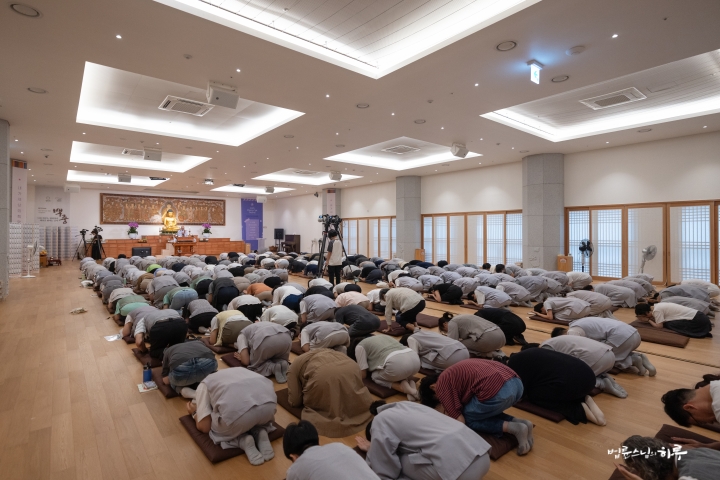
With about 4,000 Jungto Society members connected to the live broadcast, they requested a Dharma talk from Sunim with three prostrations. Sunim gave a Dharma talk for about an hour on the origins of Baekjung and the mindset for conducting Baekjung Prayer.
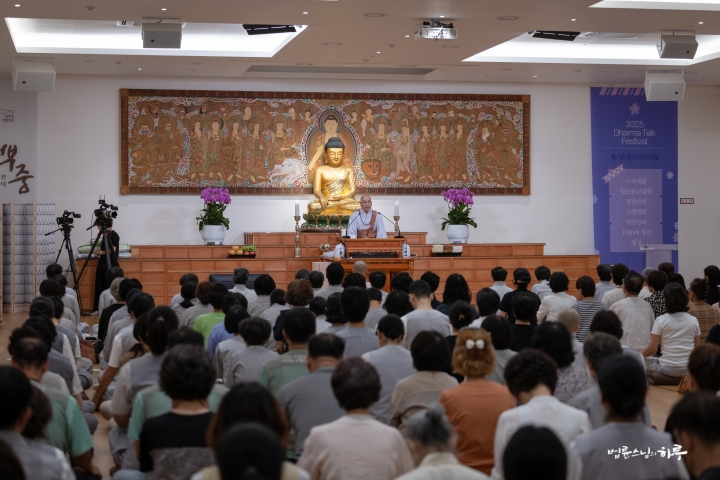
“Today is the 15th day of the 7th lunar month, the day called Baekjung or Ullambana. Baekjung is a day to honor and commemorate our ancestors. A nation must exist for its citizens to exist, and citizens receive protection from their nation. However, the greatest benefactors who have made it possible for me to be here today are my parents. For parents to exist, there must be grandparents, and for grandparents to exist, there must be their parents above them. We call all of them our ancestors. Baekjung is the day to be grateful for and commemorate the grace of our ancestors who have made our present existence possible.
Baekjung: Four Types of Grace We Must Not Forget
In ancient times, people worshipped the heavenly gods, so among various types of grace, the first was considered ‘the grace of heaven.’ The second is ‘the grace of the nation.’ In the past, since the king was the owner of the nation, the grace of the nation was the grace of the king. The third is ‘the grace of ancestors.’ And the fourth is ‘the grace of all sentient beings.’ These four types of grace are commonly called the ‘Four Graces (sa-eun).’
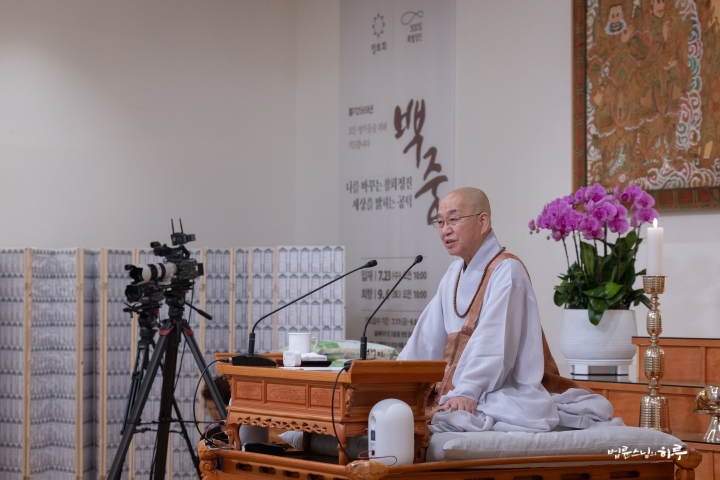
In modern terms, the first grace of heaven can be called ‘the grace of nature.’ Thanks to the sun and moon, mountains, rivers, plants, and trees, we obtain energy and sustain life. However, we often forget this grace of nature. Especially in modern times, humans have excessively destroyed nature in the name of development, causing disasters like the climate crisis. Therefore, we must not forget the grace of nature, the divine spirits of heaven and earth, even in a drop of water or a grain of rice.
Second, what we call the grace of the nation was called the grace of the king in the past, but today it can be called ‘the grace of the citizens.’ The citizens who live together with me are the owners of the nation. Therefore, we must live without forgetting the grace of our fellow citizens. Even with the grace of heaven and earth, someone must grow crops, make various goods, and build roads. We live thanks to the hard work of countless citizens. That’s why we must value each and every citizen. If I am a restaurant owner, I should prepare food with sincerity for those who make the clothes I wear and the shoes I put on. If I am a doctor, I should care for each person’s health with dedication.
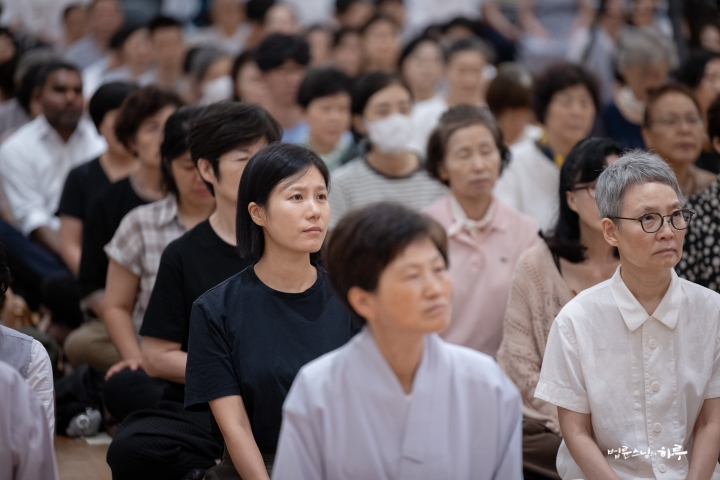
Third, we often forget the grace of our ancestors. There’s an old saying: ‘If things go well, it’s thanks to me; if things go wrong, it’s the ancestors’ fault.’ These days, since everyone lives comfortably, they think it’s all because of their own efforts. However, we must not forget the grace of our ancestors. Although we eat well now, if we go back just three generations, our ancestors lived in poverty and hunger. While we now live in an environment where human rights are protected, just 100 years ago, our ancestors had to live under tremendous abuse and exploitation, far from receiving humane treatment. Even under such conditions, our ancestors gave birth to and raised children, and lived while resisting foreign powers and oppressors. It is upon the sacrifices of these ancestors that I exist today. That’s why we must be grateful for the grace of our ancestors.
The fourth thing we should be grateful for is ‘the grace of all sentient beings.’ Sentient beings refer to all life forms connected to our existence. Today, we cannot survive with just the people of our own country. The countless items we eat, wear, and use contain the hard work of numerous foreign workers. We live by importing agricultural products produced abroad and industrial goods made in foreign countries. Therefore, we must also be grateful for the grace of all sentient beings and all life forms.
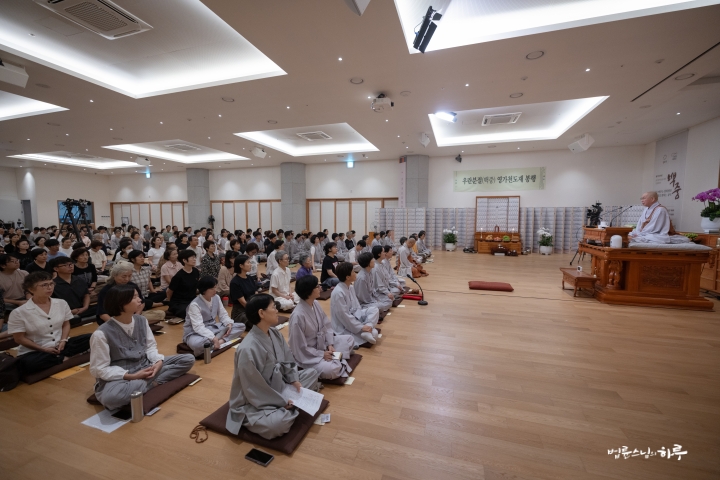
How to Right an Upside-Down Life
Among these four types of grace, what we should be especially grateful for on this Baekjung Day are first, ‘the grace of our ancestors,’ and second, ‘the grace of all sentient beings.’ This is why in the past, even servants were given freedom on Baekjung Day. Those who were human but not treated as such, who worked like animals, were given freedom for this one day. They were given pocket money to go to the marketplace, eat what they wanted, and enjoy themselves. Instead of serving their masters, on this day they became their own masters. Even livestock like oxen, who worked their entire lives, were given delicious food on this day. In a way, our lives are possible thanks to the hard work of these people we often consider insignificant. If we realize this, we won’t be arrogant or prideful, and we won’t look down on or discriminate against others. When we cultivate this mindset today, our own suffering disappears. In other words, we achieve our own spiritual liberation.
The term ‘spiritual liberation’ (cheondo) refers to rescuing those in suffering and sending them to a better place. In Sanskrit, it’s called ‘Ullambana.’ It means to right what has been hung upside down. Being hung upside down refers to how we live benefiting from the grace of our ancestors, the grace of all sentient beings, and the grace of heaven and earth, yet our eyes are blind and our ears are deaf to this truth. We destroy nature, discriminate against, ignore, and abuse sentient beings, and even disrespect our ancestors in our self-importance.
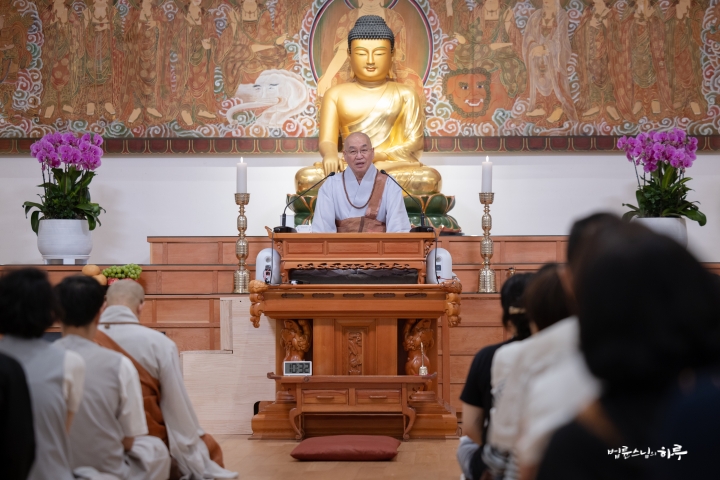
In the past, people believed that the afterlife was a reflection of how one concluded their current life. Whether or not there is an afterlife wasn’t the important issue. Rather, people in the past believed that after evaluating and concluding one’s current life, the next life would follow. They taught that if one lived carelessly in this life, they would suffer in the next, so one should live this life well. Foolish people thought they were living well, but when they finally concluded their lives, they found they had created karma that would lead them to hell. They had lived their lives backwards. This is why we perform Baekjung Prayer to awaken from a life lived backwards and set it right. It’s about opening the eyes of the blind, enabling the deaf to hear, and enlightening the ignorant, so they can appreciate the grace of heaven and earth, be grateful for all sentient beings, and recognize the kindness of their ancestors. When we realize that we live surrounded by countless blessings, we won’t carelessly harm even a blade of grass or a single tree, and we’ll learn to respect all people regardless of their gender or social status.
Therefore, Baekjung is a day when I awaken and guide myself to a better place. The method of awakening and guiding myself is achieved through the practice of remembering our ancestors’ grace and guiding them to a good place. Through such rituals, it ultimately becomes a day of awakening for ourselves.
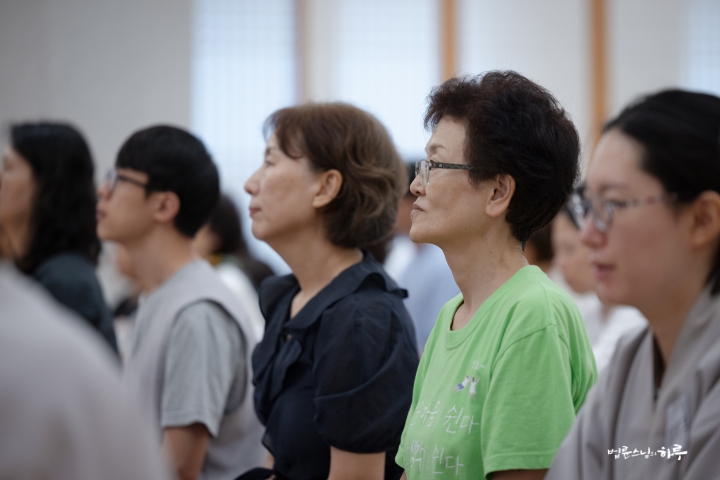
A Day to Honor Ancestors and Liberate Ourselves
This is not a commemorative day created by the Buddha. The Buddha taught being awake in the present moment, anywhere and anytime, and did not place importance on specific days or places. However, in traditional Indian culture, there were commemorative days for worshipping specific deities like Shiva or Vishnu, and among them was a day for honoring ancestral spirits. This falls on the 15th day of the 7th lunar month in our calendar. On that day, people would cook rice and scatter it by the riverside, performing traditional rituals to help ancestral spirits go to a better place. This custom eventually made its way into Indian Buddhism.
From the perspective of a culture that venerates ancestral spirits, there was concern that leaving home to practice might be considered unfilial, showing ignorance of parental grace. Especially in Confucian cultural spheres like China and Korea, where filial piety was valued above all else, leaving home was regarded as unfilial behavior. However, Indians viewed monastic practice as a great path toward true freedom and liberation, considering it a path that transcended the grace of ancestors or nation. Leaving home was not seen as an act of disloyalty that abandoned family, friends, and country. Just as we praise those who leave their families to sacrifice for their country as patriots, Indians highly praised and regarded as great those practitioners who left everything behind to pursue the ultimate truth of humanity. Therefore, whenever monastics arrived, everyone would offer them food, and even kings would pay their respects when encountering them on the road. While the culture was somewhat different from ours, this didn’t mean that leaving one’s family wasn’t without regret. That’s why the Buddha, when leaving home, made a vow: “I am not leaving home for my personal benefit, but to find the path of true freedom and return to share it with my family and relatives.” This was fundamentally different from concepts of leaving home due to failed romance, grief over family deaths, or failing exams. Monastic practitioners were respected as great beings with more courage than becoming a king.
However, ordinary people could not easily break free from the strong bonds of family affection. Therefore, Buddhism adopted this day of honoring ancestors, creating a belief among people that when one person from a family becomes a monastic, many people in that family would be liberated. Rather than negating the act of leaving home, they created a culture where families could also rejoice. In this way, the commemorative day for honoring ancestors was first adopted by Indian Buddhism, and as it crossed into China, it became even more emphasized. As it combined with Chinese filial piety and Korean ancestor worship traditions, it established itself as an even more significant commemorative day. This day is not the Buddha’s birthday, nor the day he left home, attained enlightenment, or entered nirvana. However, the Baekjung Prayer for honoring ancestors, along with the New Year’s Prayer and Winter Solstice Prayer, has become established as one of Buddhism’s three major prayer periods, despite not being an official Buddhist commemorative day.
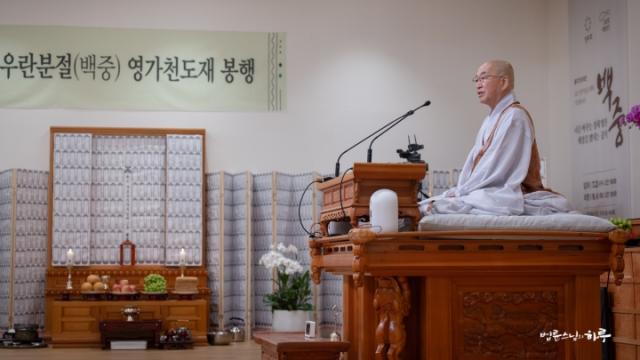
We must inherit and respect this culture. Beyond simply being grateful to our ancestors who made our existence possible and honoring their intentions, we must have gratitude for all beings that enable our existence. We must be grateful for the grace of nature, which we call the heavenly spirits and earthly deities, the grace of our country and society, and the grace of all sentient beings, and realize that we exist because of them. If we have carelessly ignored or discriminated against these precious things, we should take this Baekjung Day as an opportunity to realize their importance once again. Therefore, Baekjung Day is not only Environment Day but also Labor Day and Parents’ Day.
We have conducted the 49-day memorial service according to tradition, and today is the day we hold the seventh and final memorial service for the deceased. When we generate gratitude toward all beings that made our existence possible, our ancestors can be liberated through that heart. The wounds, resentment, hatred, sadness, and regret toward our parents that remain in our hearts, such attachments hinder our freedom and also hinder the free life of our ancestors. Therefore, we must let go of all the attachments that have been in our hearts today. We must give them freedom by letting go of what we have been holding onto. We must also release all the knots in our hearts by letting go of what we have been grasping. So today should become a day of liberation, a day of enlightenment.
A Day to Let Go of Attachments and Open New Hope
While we should change terminology and rituals to fit the times and circumstances when possible, culture is something that countless people have practiced over long periods. As such, there may be elements that seem irrational from today’s perspective. However, what’s important is not whether it fits current reality, but that our ancestors created and practiced this culture with these intentions. For example, the Jeongcho Prayer to prepare our hearts at the beginning of the year, the Baekjung Prayer to be grateful for our ancestors’ grace and all living beings that enable our existence, or the Winter Solstice Prayer that marks the end of life’s downhill journey and the beginning of new hope tomorrow – these traditional cultures have sufficient value to be preserved in modern society. That’s why Jungto Society continues to steadily inherit these three traditional cultural practices.
Therefore, those who harbor resentment and hatred toward their parents should let go of those feelings today and generate gratitude, and those who hold onto sadness and regret should release those attachments and participate in this Baekjung closing prayer with the intention of attaining freedom and liberation.
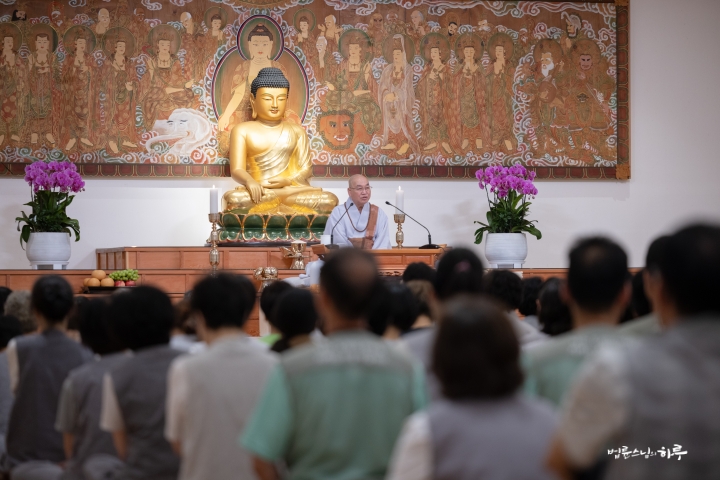
For the past hundred years, we have thought that Western culture was more advanced and that our culture was backward and inferior. However, as we have acquired scientific technology and our economy has developed, we have gained some confidence. Recently, movies, dramas, and animations have been rediscovering our traditions, which is why some of these elements are now shining through. There are still many such elements hidden within our numerous traditions. Compared to Valentine’s Day, Pepero Day, or Halloween, Baekjung has tens or even hundreds of times more meaning. So I hope young people will participate in Baekjung with an attitude of recognizing the value of our traditional culture and bringing it to life.
Liberating the spirits of our ancestors is the same as letting go of all attachments in our minds. When you visit a shaman while holding attachments in your heart, they will say, ‘Your ancestral spirits have not been liberated.’ However, if you visit after letting go of your attachments, they will say, ‘Your ancestral spirits have gone to a good place.’ This happens because one person has attachments while the other does not. All suffering does not come from outside but originates from our own minds. So on this Baekjung Prayer day, I hope you will release all the knots in your hearts and pray that both you and your ancestors may attain liberation together.”
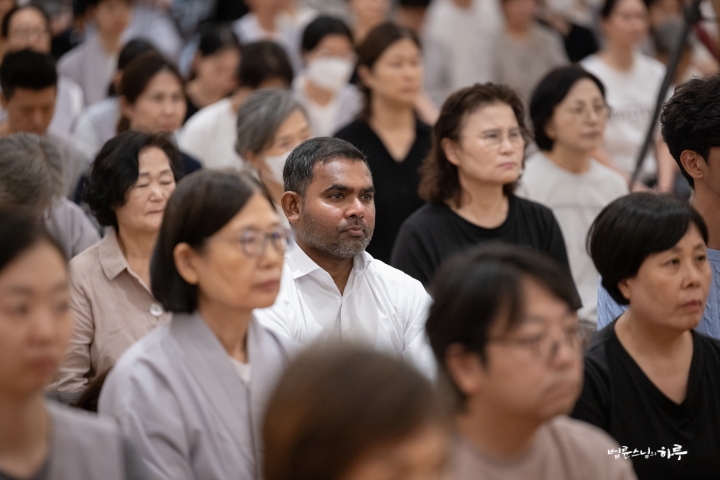
After concluding the Dharma assembly with the Four Great Vows, the participants engaged in mindful sharing.
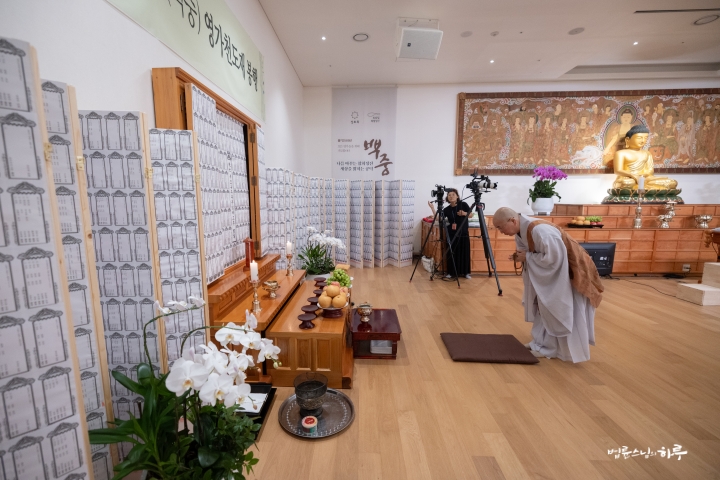
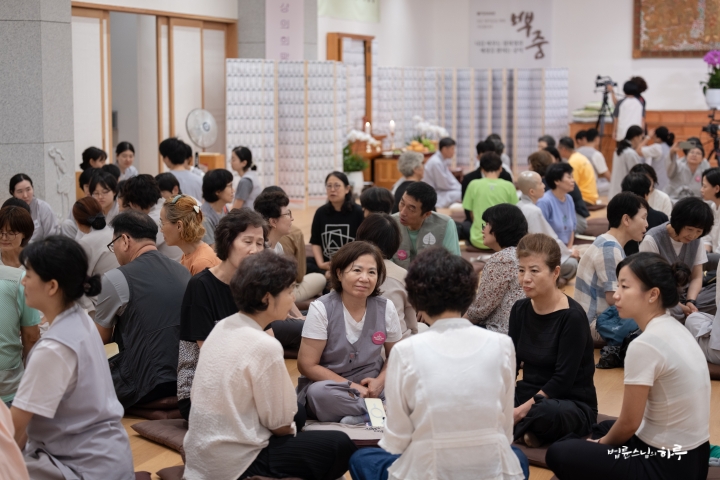
After the mindful sharing and a short break, the final memorial service of the Baekjung Prayer was held at 11:30 AM, officiated by Venerable Yusu.
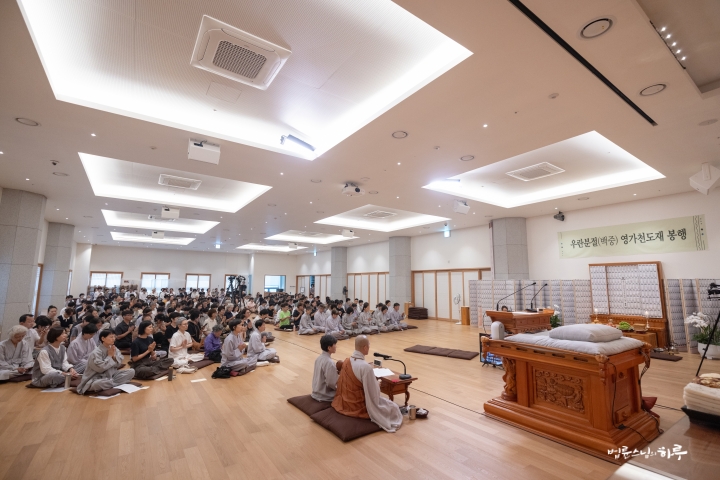
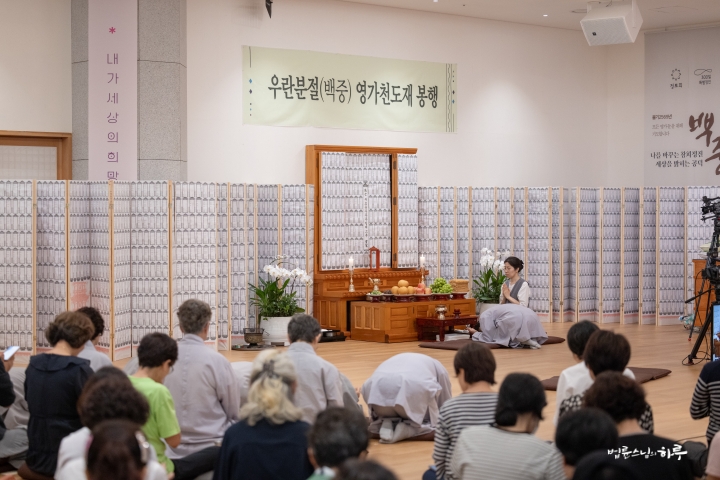
Sunim had lunch with the members of the Sangha in the basement dining hall. At noon, he met with the JTS Secretary General to discuss preparations for the JTS 32nd anniversary event. The Secretary General explained the planning proposal in detail.
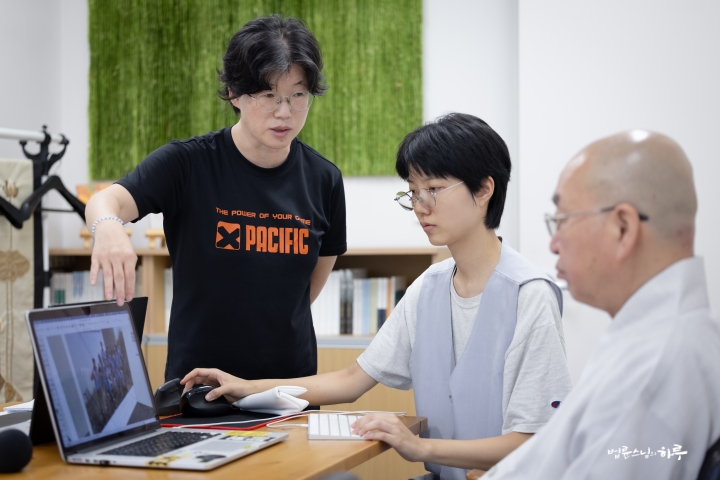
“At the end of October, we plan to hold a photo exhibition at the Jungto Social and Cultural Center showcasing JTS’s journey over the past 30 years. We will invite various relief organizations and JTS supporters for a commemorative seminar.”
After reviewing the proposal, Sunim offered various suggestions and concluded the meeting.
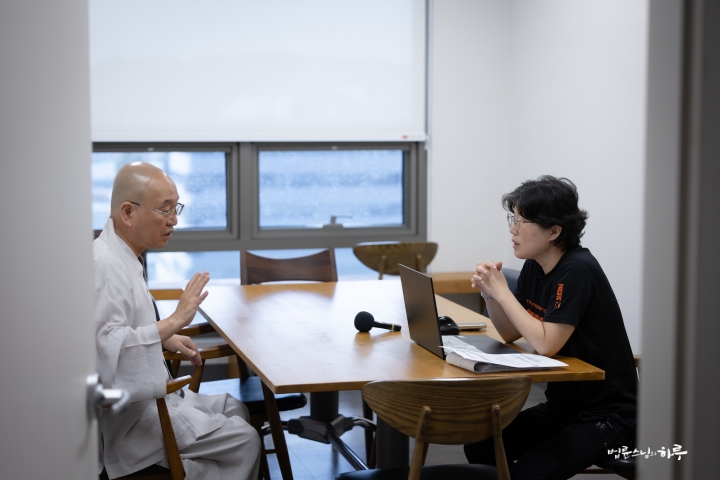
From 1 PM, Sunim received a report from the Peace Foundation Planning Committee Chair about the Peace Foundation’s activities for the second half of the year.
At 2 PM, a North Korea expert visited Sunim for a two-hour meeting. They discussed at length what role to play for peace on the Korean Peninsula, amid concerns about the strengthening of trilateral cooperation among North Korea, China, and Russia following China’s 80th Victory Day parade a few days ago.
Subsequently, the head of the Special Youth Division presented plans for the Youth Festa scheduled for November and sought Sunim’s advice.
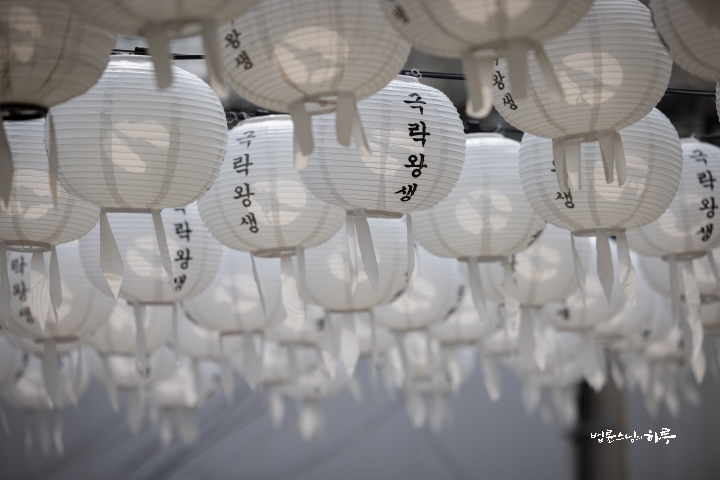
After consecutive meetings, Sunim concluded his daily activities after 5 PM. He retired early to rest and recover from the fatigue accumulated during his overseas lecture tour.
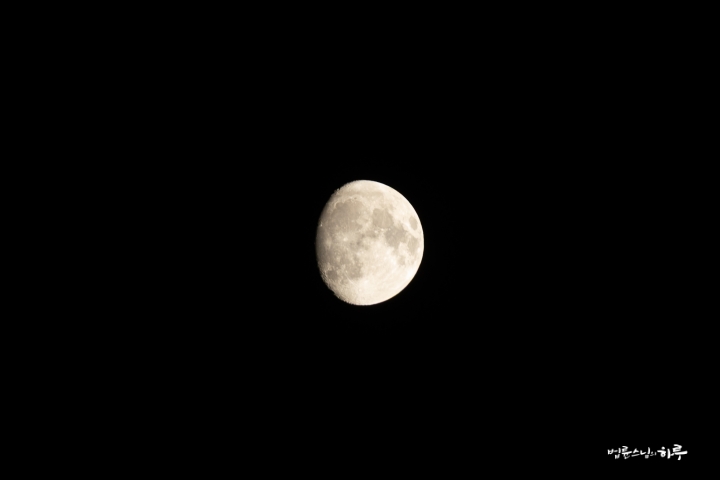
Tomorrow morning, Sunim will hold the opening ceremony for the final 10th 100-Day Prayer of Jungto Society’s 2-1st 1000-Day Practice at the Jungto Social and Cultural Center. In the afternoon, he will attend the Gyeongnam Division Members’ Day event, and in the evening, he will depart from Incheon Airport for Europe to begin his European lecture tour.





